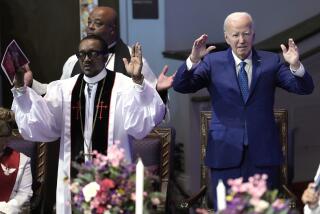Activist Advises Churches on AIDS
- Share via
CHARLOTTE, N.C. — About 300 black church pastors and activists gathered for a meeting on AIDS in the black community, and the message they got from Pernessa Seele was simple: Get involved.
Seele is founder and head of a group called The Balm in Gilead, which for 14 years has helped black churches address AIDS in their communities through prayer, education and outreach.
“Twenty-two years into this epidemic, the response to this disease continues to be driven by politics and theology -- not by public health and compassion,” said Seele, whose group organized the late-May meeting. “If we’re looking for someone to come and save us -- sorry.”
According to the federal Centers for Disease Control and Prevention, more than half of the approximately 40,000 new HIV infections each year occur among blacks, though blacks make up less than 15% of the U.S. population. One in 50 black men is HIV-positive. And more than 60% of AIDS cases reported among American teenagers in 1999 were among blacks.
“These numbers did not become alarming just yesterday,” Seele said. “They have been alarming in our community for 22 years.”
For many black churches, the way into a conversation about AIDS is through The Balm in Gilead’s annual “Black Church Week of Prayer for the Healing of AIDS.” About 12,000 black congregations participate.
“The week of prayer kind of opens the dialogue” at a lot of churches, said Seele, an immunologist who founded The Balm in Gilead after she was frustrated by her inability to get churches in Harlem to address the AIDS problem.
(The group’s name is taken from the biblical Book of Jeremiah, used in an African American spiritual: “There is a balm in Gilead / To make the wounded whole / There is a balm in Gilead / To heal the sin-sick soul.”)
At many churches, Seele said, the week of prayer moves congregants to approach their pastors about AIDS.
Seele and others at the meeting said AIDS can be a tough topic for many pastors in black churches because their denominations -- like those of their white counterparts -- are conservative in their approach to sexuality.
“People don’t want to address homosexuality,” said the Rev. Judy Johnson, a faculty member at Shaw University in Raleigh and a member of the First Baptist Church in Clinton.
For a gay person with HIV, the stigma can be a barrier to seeking -- and receiving -- the support that might otherwise come from the church if the problem were different, she said.
George Roberts, who heads the Office of Minority Health at the CDC in Atlanta, bombarded conference participants with statistics about AIDS in the black community.
“For the first time, some of us are going to have to talk about sex in a real way, because sex can kill us,” said Roberts, a member of the choir at Atlanta’s Ebenezer Baptist Church.
Workshop topics at the meeting last week in Charlotte included strategies to mobilize church communities on the issue; where to go for funding; how to teach abstinence; and how to teach “survival techniques” to teenagers.
More to Read
Sign up for Essential California
The most important California stories and recommendations in your inbox every morning.
You may occasionally receive promotional content from the Los Angeles Times.













